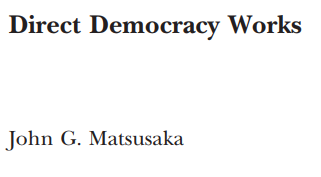Until recently, direct democracy scholarship was primarily descriptive or normative. Much of it sought to highlight the processes’ shortcomings. In this paper, John G. Matsusaka describes new research that examines direct democracy from a more scientific perspective. We organize the discussion around four “old” questions that have long been at the heart of the direct democracy debate: (1) Are voters competent?; (2) What role does money play?; (3) How does direct democracy affect policy?; and (4) Does direct democracy benefit the many or the few? Ultimately, the author finds that recent breakthroughs in theory and empirical analysis paint a comparatively positive picture of the initiative and referendum processes. For example, voters are more competent, and the relationship between money and power in direct democracy is less nefarious, than many observers allege. More new studies show that the mere presence of direct democracy induces sitting legislatures to govern more effectively.












